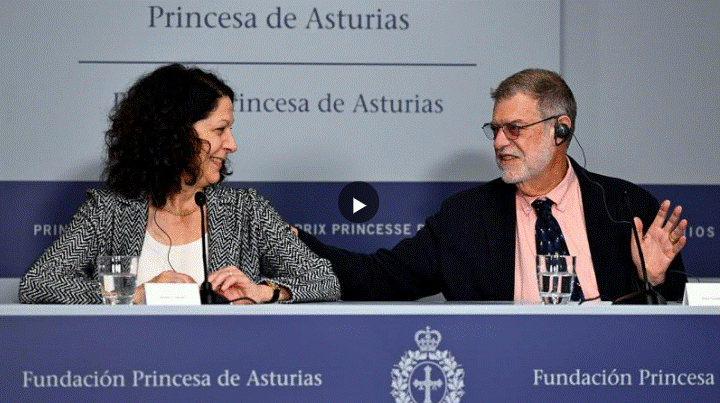
Today, Bonnie Bassler, Jeffrey Gordon, and Peter Greenberg are receiving the Princess of Asturias Award for their contribution to the knowledge of the role of the human microbiome and the bacteria Quorum Sensing.
Targeting Quorum Sensing allows understanding of bacteria behaviour and pathogenesis, but also developing new therapeutic and diagnostic strategies for infectious diseases.
Bonnie Bassler has shown how small chemical signals are involved in such a communication process.
Peter Greenberg was one of the first scientists who assigned the term Quorum Sensing (QS) to such a sophisticated system used by bacteria to communicate and synchronize behavior. He was involved on the discovery of the QS signalling pathways of important pathogens such as Pseudomonas aeruginosa and their implication on virulence and biofilm formation, key for the establishment of chronic and antibiotic-resistant infections
Jeffrey Gordon is a pioneer of microbiome research. These billions of bacteria living in our bodies have an extraordinary effect on our health, determining metabolic or even neurological disorders. His discoveries are tackling global issues such as childhood malnutrition.
The winners explained at the press conference the importance of this award:
“I couldn’t imagine that was going to be awarded the “Premio Princesa de Asturias” when I see those who have achieved it… they are icons, they are my idols in all kinds of fields!”, said Bonnie Bassler. Peter Greenberg explained that it is not only a recognition of the work done over many years in their research group but also of the work done by all the scientists in microbiology “This honor that has been granted to us is a recognition of how important microbiology and science in general is”.

From NANBIOSIS ICTS we want to congratulate the winners and thank the Princess of Asturias Foundation for the recognition of a piece of research which is of specific interest in our Unit 2-CAbS, research group Nb4D – from CIBER-BBN and IQAC-CSIC, led by M. Pilar Marco. Her research line is focused on the development of diagnostic and therapeutic strategies for infectious diseases targeting the aforementioned Quorum Sensing (QS) and based on antibody-funded technologies. The QS is a sophisticated cell communication system controlling a series of cellular processes involved in pathogenesis, based on the release and detection of small signaling molecules (QSsm).








